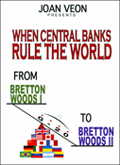VOTER FRAUD: RESEARCH STUDY SUGGESTS MAJOR ELECTION PROBLEMS
By
NWV News Writer Jim Kouri
Posted 1:00 AM Eastern
February 23, 2012
© 2012 NewsWithViews.com
In a typical system, election officials get information about a voter’s identity, eligibility, address, and contact information through a form completed at a public agency, such as a county election office or motor vehicles office, or through an unregulated third party voter registration group, such as a campaign or advocacy organization (ACORN, Project Vote). - The Pew Center
A major non-partisan research project suggests that the U.S. is fast approaching the status of Third-World Nation when it comes to the integrity of local and national elections.
"Our democratic process requires an effective system for maintaining accurate voter registration information. Voter registration lists are used to assign precincts, send sample ballots, provide polling place information, identify and verify voters at polling places, and determine how resources, such as paper ballots and voting machines, are deployed on Election Day" state Pew Center statisticians.
These systems are plagued with errors and inefficiencies that waste taxpayer dollars, undermine voter confidence, and fuel partisan disputes over the integrity of our elections, according to Pew researchers.
Voter registration in the United States largely reflects its 19th-century origins and has not kept pace with advancing technology and a mobile society. States’ systems must be brought into the 21st century to be more accurate, cost-effective, and efficient, according to Pew Center statement.
Research commissioned by the Pew Center on the States highlights the extent of the challenge.
•
Approximately 24 million—one of every eight—active voter
registrations in the United States are no longer valid or are significantly
inaccurate.
•
More than 1.8 million deceased individuals are listed as active voters.
• Approximately 2.75 million people have active
registrations in more than one state.
Meanwhile, researchers estimate at least 51 million eligible U.S. citizens are unregistered, or more than 24 percent of the eligible population.
The Pew study also found that the paper-based processes of most registration systems present several opportunities for error.
In a typical system, election officials get information about a voter’s identity, eligibility, address, and contact information through a form completed at a public agency, such as a county election office or motor vehicles office, or through an unregulated third party voter registration group, such as a campaign or advocacy organization (ACORN, Project Vote).
| Subscribe to the NewsWithViews Daily News Alerts! |
These are sent to election offices, where the data often are manually entered and names are added to the voter list. A voter must supply any change to that information, such as a new address, name, or party affiliation, which is usually manually entered and processed by election officials.
The study also identified:
•
Approximately 12.7 million records nationwide that appear to be out
of date and no longer reflect the voter’s current information.
•
More than 1.8 million records for people who are no longer living, but
have active
registrations on voter rolls.
•
About 12 million records with incorrect addresses, indicating that either
the voters have moved, or that errors in the information on file make
it unlikely the Postal Service can reach them.
© 2012 NWV - All Rights Reserved










 Share
This Article
Share
This Article






